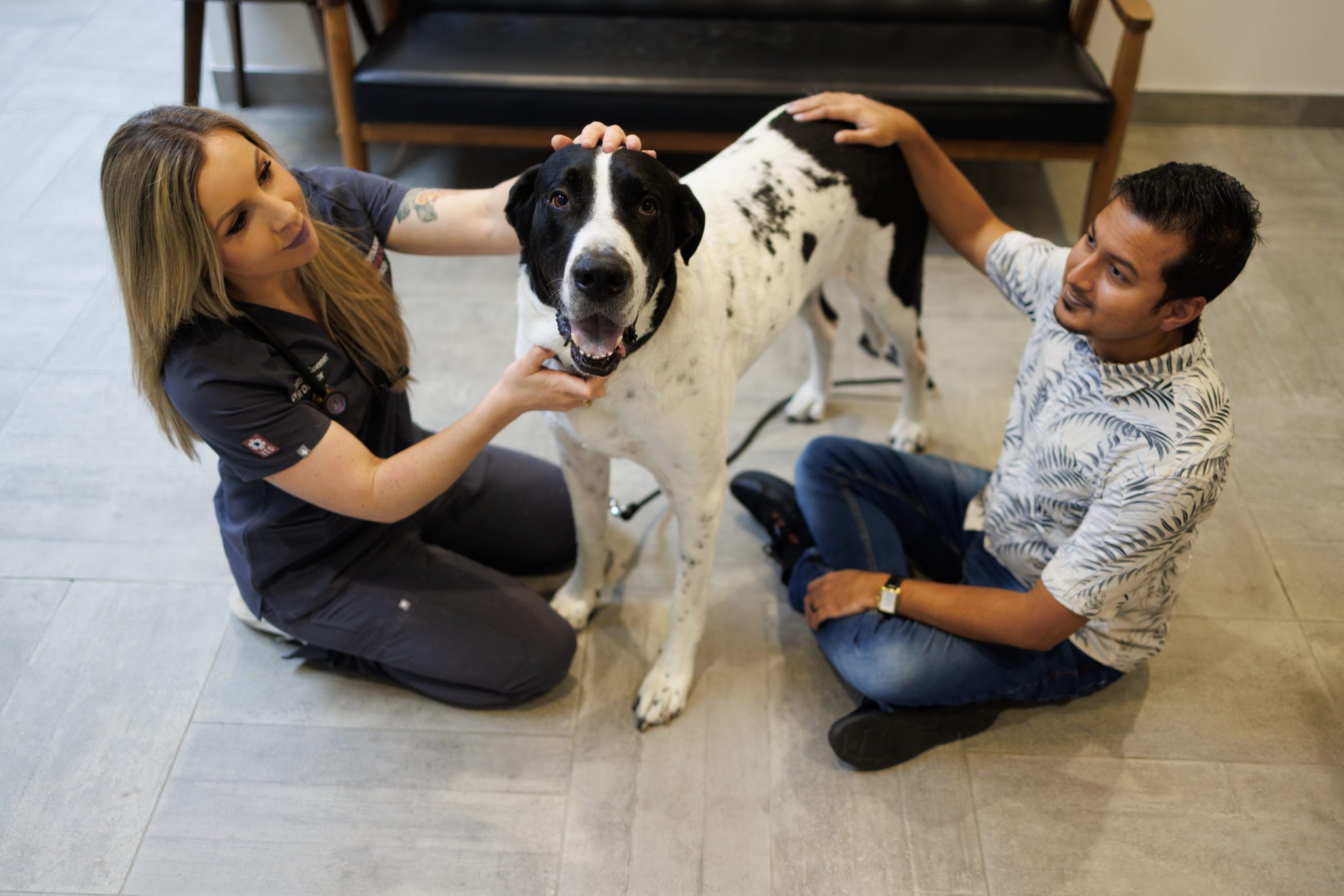
Mosquito Bites on Dogs: Are They Dangerous?
Dr. Holly Dutton
Call & Speak with a doctor Open 24/7, Even Holidays!
Walk in today for:
Emergencies
Point-of-Care Ultrasound
Urgent Care
X-Rays
Diagnostics + Testing
End-of-Life Care
Surgery
Treatment + Hospitalization
When mosquito season hits, pet owners once again find themselves worrying more and more about mosquito bites on dogs. If this sounds like you, you’re not alone—and we’re here to help! The fact is, when a dog gets bit by a mosquito, there can be dangerous risks for your dog’s health. This depends on the severity of the bites but most of the time it isn’t much to worry about.
In this article, we’ll help you know what signs to look for as well as what needs immediate attention. This blog does more than scratch the surface on mosquito bites, however, nothing beats an in-person exam. If you are worried about mosquito bites on your dog, we recommend you take them to a vet or a VEG emergency vet right away. You can call our VEG ER for pets and speak with a veterinarian who can answer your questions about dogs and mosquito bites.
RISKS OF MOSQUITO BITES ON DOGS
If your dog was outdoors and has been bitten by a mosquito, below are some mild symptoms your doggo may experience:
Itching and pain from mosquito bite
Just like in humans, mosquito bites frequently cause itching and pain in dogs. If your dog experiences a mosquito bite, it will most likely turn into a raised welt like it would on a human. This may drive your dog a little batty because welts from bites can be extremely itchy until it goes away. Depending on the breed of your dog, the frequency of the bites may be limited. For example, long-haired dogs are less likely to get bitten by a mosquito versus short coats.
If you notice your dog scratching a lot and find that he or she is focusing on one spot, check for the presence of mosquito bites. Below are the risks, from mild to severe, that can happen with a mosquito bite.
Mild risks for canine bit by mosquito
In some instances, you may notice mild swelling. The swelling may be in the area of the mosquito bite, or it could spread a little bit on the same part of the body. Small mosquito bites can mimic skin infections, and vice versa, so best to get any swelling checked out at your nearest VEG ER.
Moderate risk for mosquito bite on dog
So, you can see that swelling is a mild risk, but let’s talk about more moderate risks than can accompany a mosquito bite on a dog. These include:
1. Damage to your dog’s skin
When dogs experience itching and discomfort, their instinct is to scratch and lick at the area. Unfortunately, constant licking and scratching can damage the skin barrier, causing more discomfort and opening the door to potential bacterial infections.
2. Infection after your dog gets a mosquito bite
If your dog scratches a mosquito bite so much that it bleeds and becomes an open wound, it is susceptible to infection from environmental contaminants. Take your dog to a VEG emergency room for pets, because a trained emergency vet knows how to treat the infected area.
3. Hot spots on dog’s skin
Hot spots on a dog can be ruff! If your dog is licking, chewing, and scratching the same place on his or her skin, it can cause your dog to develop a hot spot, likely after any mosquito bite symptoms begin to ease up. Before using any over the counter medication, please contact your family veterinarian for advice. Talking with your primary veterinarian can sometimes minimize the risk of your dog’s skin problem becoming an emergency, but of course, VEG is always here to help!
Serious risks of mosquito bites on dogs
So, a mosquito bit your dog—how bad can it get? Well, while most mosquito bites may not seem like a big deal, in rare cases, they can actually cause serious risks to your pet’s health.
If you think your pet may be suffering from any of the risks below, or if you’re concerned about their mosquito bites, take them to your VEG emergency vet right away.
Heartworm disease in dogs
Heartworms are transmitted solely through mosquito bites. Mosquitoes become infected when they bite an infected animal, and then help to spread heartworms to more hosts. Heartworm infection can be fatal if left untreated! That’s why it’s crucial for your dog to have proper heartworm protection. Heartworm infection can cause irreversible long-term damage to your pet’s heart and lungs. Treatment is possible, and it may even require surgery.
Here’s the yucky process of heartworm in dogs for curious canine owners: Heartworm disease takes time to progress, as the larvae in the bloodstream travel to the heart. There they take root and mature into adult heartworms. As the worms grow and proliferate, they begin to block the heart’s arteries. This can interrupt blood flow and forces the pet’s heart to work much harder. This is why dogs need to be kept on heartworm prevention year-round!
West Nile virus in dogs
Us humans fret about it, but did you know that dogs can get West Nile virus too? Yes, dogs can contract West Nile if bitten by an infected mosquito, just like humans can. This severe illness may cause:
- Fever
- Mobility issues
- Seizures
- Fatality, in some cases
It’s worth noting that it’s very unlikely for dogs to infect humans with the West Nile virus.
Allergic reaction from mosquito bite
Although rare, it is possible for mosquito bites to cause a severe anaphylactic reaction in some dogs. This dangerous allergic reaction could lead to a closing of the airways, which in turn could be fatal without prompt medical treatment. Learn more about allergic reactions in dogs here.
HOW TO PROTECT YOUR DOG FROM MOSQUITO BITES AND HEARTWORM DISEASE
Dogs should enjoy the outdoors and live a full, happy life. And avoiding mosquitoes entirely is impossible but there are preventative steps you can take to minimize your pet’s exposure to mosquitoes and to help prevent heartworm disease.
1. Heartworm prevention for dogs
The first and most important step is to give your dog their monthly heartworm preventative. Missing a dose can increase their risk for infection, so be sure to mark your calendar!
2. Add citronella to your yard to act as a mosquito repellent
Another step you can take to help prevent mosquito bites on dogs is to make your yard a less hospitable place for mosquitoes. Citronella candles and citronella grass can be effective mosquito repellents for dogs, and help to keep flying pests at bay.
3. Use essential oils to repel mosquitos
Mosquitoes have a very keen sense of smell. In addition to citronella, mosquitoes also hate the scent of rosemary, lavender, peppermint, and lemon eucalyptus. Warning: do not let your dogs or cats get into essential oils, as that can create another emergency! Strategically placed oils, in areas your pet cannot reach or get into may help prevent pests.
4. Eradicate potential mosquito breeding grounds
Oh, how mosquitoes love standing water! It’s an ideal breeding ground so check your property for standing water, and be sure to empty out and refill your bird bath (if you have one) regularly.
Call Us for More Information about Mosquito Bites on Dogs
As you can see, it’s not always serious when your dog gets mosquito bites. However, bites can certainly lead to more serious health risks if not cared for properly. The best thing you can do for your pet is to try and prevent them from getting bitten in the first place.
For questions about mosquito bites on dogs, or if you’re worried about some of the risks that are associated with them for your dog, call any of our VEG locations. All of our emergency animal hospitals are open 24/7, so even if your dog was bit at night, we’re open! At VEG, you can speak with a veterinarian right away or come in and we’ll triage your dog within seconds. Best of all, you stay with your dog the entire time.

